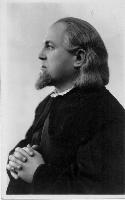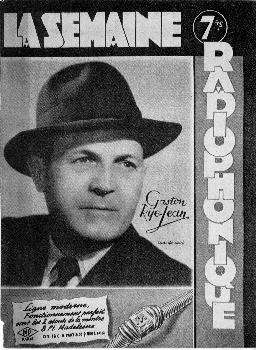Gaston Rye-Jean
La Juive
Gaston Jeanjean, aka Rye-Jean, was born in Mauguio, a village close to Montpellier, on September 6th, 1900. He was the son
of a local vine grower. While working on his parents' farm, Rye-Jean studied singing with other local amateurs. Following the
recommendations of a fellow amateur, Rye-Jean enters the conservatory of Montpellier, where he was a student of Madame Mellot-Joubert,
spouse of the composer Maurice le Boucher, who had been a student of Fauré and received the Prix de Rome in 1907. Madame Mellot-Joubert
taught him the love for the music of Duparc, Bach, Lully, Debussy, Fauré. Rye-Jean studied with her from 1927 to 1934.
In spring 1934, Reynaldo Hahn, while passing through Montpellier, visited the rural singers of Mauguio. Hahn was very surprised by the
vocal and musical qualities of those young singers who had among them Gaston Rye-Jean. In his book 'L'oreille au guet', published in
1937, Reynaldo Hahn related his visit in the chapter titled 'Un biologiste'. On page 260, Hahn wrote the following on Rye-Jean:
All I know is that Mr. Claret has offered us the proof for the vocal technique he recommends, in the person of Mr. Jeanjean
whom he has taught. This heroic tenor, who is gifted with a beautiful voice and whose health has not encountered the problems that Mr. Claret
had, sang with superb power and great sensibility arias from Guillaume Tell, Samson and L'Africaine. This winter, he will sing those
works in an important provincial theatre, whose audience will not guess upon listening to him that all those Bs flats and high Cs, so
large and brilliant, are all sung with head resonance.
Under the name Gaston Airil, Rye-Jean made his debut in Lyon at the Grand Théâtre in October 1934 as Éléazar
and appeared also as Arnold.
Rye-Jean received a contract for the Paris Opéra starting on July 1st, 1935. He stayed there until September 1937. Rye-Jean was
rather bored during his stay. Besides rehearsing with Madame Louis Fourestier all the tenor roles sung at the Opéra (Lohengrin,
Samson et Dalila, Fidelio, Aida, Rigoletto, Faust, La damnation de Faust, Hérodiade, Il trovatore) and perfecting his
acting with Madame Chéreau, he was only employed to sing minor parts on stage. Rye-Jean made his debut at the Opéra on
October 14th, 1935 as the First Philistine in Samson et Dalila. This was followed on October 25th by a knight in Parsifal (with
de Trévi, Singher, Huberty, Narçon, Lubin and Ruhlmann). He participated at the revival of Marouf (as L'anier on July 2nd,
1937), Der Rosenkavalier (Sänger) and at the premiere of La Samaritaine (composer: Max d'Olonne) on June 23rd, 1937 as Le Schoer.
On September 21st, 22nd and 26th, 1937, Rye-Jean received the first prize in the International Singing Competition, organized by the Institut
Vocale of Paris under the patronage of Euphomia, a vocal research institute. The jury included among its members Muratore and Heldy.
He sang 'Esprits gardiens' and 'Asile héréditaire'.
In 1937 and 1938, Rye-Jean sang in Montpellier: 10 October 1937, Arnold in Guillaume Tell with Tindel (Guillaume), Enia (Walter),
Spinadel (Mathilde) and Bascou conducting; 14 October, Jean in Hérodiade with Spinadel (Salomé), Tindel (Hérode),
Mistral (Hérodiade), Enia (Phanuel) and Boucoiran conducting; in Ghent: 10 November 1937, Radames in Aida with Yarborough,
Prondy, Leroy, Lahous, Elsy and de Préter; in Dijon: 10 February 1938, Éléazar in La Juive; and in Angers: 3 March
1938, Éléazar again.
Rye-Jean made his debut at the French radio on May 17th, 1938 under the name Georges Rye as Kratos in Prométhée with
Etcheverry (Héphaïtos), Maurice Prigent (Andros), Maria Branèze (Bia), Eliette Schenneberg (Gaïa), Turba-Rabier
(Aenoë), Georges Cusin (Hermès), Germaine Rouer (Pandore), Jean Hervé (Prométhée) and Inghelbrecht
conducting the Orchestre National. The concert was broadcast live from the Salle du Conservatoire. On June 13th, Rye-Jean took part in
a concert given at Salle Gaveau singing Vladimir in Knjaz Igor with Germaine Cernay, Etcheverry and Inghelbrecht conducting. He
participated in many radio concerts: June 25th at Studio des PTT; August 4th at Radio-Paris singing music by d'Indy, Weckerlin, Gounod,
Berlioz, Fauré, Duparc and Ravel; July 18th at Paris-Mondial, singing songs and folklore from Provence; August 2nd at Salle
Camé-Radio, singing the role of the Centurion in Ponce-Pilate; August 11th, at Studio des PTT, singing songs.
At the end of August 1938, Rye-Jean's mother died. He went back to Mauguio and stayed there working at the farm because of the war.
After the war in 1945, Rye-Jean auditioned for the Radio Diffusion Française and was hired by the conductor Jules Gressier. He
stayed there until June 1949, and sang La favorite, Guillaume Tell, Le trouvère, Esclarmonde, La Juive, La muette de Portici,
Samson et Dalila, Lucia di Lammermoor, Otello (Rossini), Le prophète, L'Africaine, Les huguenots, La damnation de Faust,
Hérodiade, La bohème, Tosca, and Le Cid. He participated regularly in opera broadcasts every Friday evening and matinees
on Thursday from 12.30 to 2 pm. Radio concerts he participated in included:
23 October 1947, arias
20 May 1948 at the Studio Paul Lelong, the best of Massenet
4 June 1948 at the Studio Armand Moisant, La favorite
14 July 1948 at the Studio Armand Moisant, La favorite
3 September 1948 at the Studio Arnand Moisant, arias
25 December 1948, arias
1 January 1949, arias
12 April 1949, arias
28 April 1949, Rossini program
30 June 1949, Rossini program
12 August 1949, Guillaume Tell with Charles Cambon (Guillaume), André Philippe (Walther), Lucien Lovano (Melcthal), Adrien Legros
(Gessler), Pierre Giannotti (Ruodi), Louis Rialland (Rodolphe), Maria-Giovanna Vitale (Mathilde) and Jules Gressier.
The broadcast of Guillaume Tell was recorded. Unfortunately the masters have been lost. At the radio, Rye-Jean created
Léonidas by Eugène Bozza with Tony Aubin conducting.
On October 10th, 1947 in Bordeaux, Rye-Jean reappeared on stage for the first time since 1938 singing in Guillaume Tell with Nougaro
(Guillaume), Marzo (Walter), Gaillan (Ruodi), Taverne (Gessler), Boni (Mathilde) and Lebot conducting. On February 27th, 1949 he sang
Arnold at the Théâtre Royal in Namur with Pierre Nougaro (Guillaume), Montellier (Ruodi), Bréville (Walter), van
Drix (Gessler), Nelly Genens (Mathilde) and Gailhard conducting.
Rye-Jean had to stop singing in 1949 because of heart problems. He retired to Nogent-sur-Marne and taught singing until his death in
1961 (March 22nd) from a heart attack.
In RA format
Discography
Disques Pyral (flexible)
12", with piano, unpublished private recordings, recorded 5 May 1947
1604 La favorite (Donizetti): Un ange, une femme
1604 La favorite (Donizetti): Ange si pur
Guillaume Tell (Rossini): Asile héréditaire
Éditions Cécilia
10", piano accompaniment by Madame Moréna, no date given
Rigoletto (Verdi): Comme la plume au vent
La Juive (Halévy): Dieu que ma voix tremblante
Radio France, 1946
Samson et Dalila (Saint-Saëns), act 2 with Suzanne Lefort (Dalila),
Charles Cambon (Le Grand Prêtre)
Orchestre Radio-Lyrique, conductor Jules Gressier
Presumably in 1934, the cheap warehouse record label Disclair (Edison Bell's French affiliate) issued one disc by a tenor labeled as
"Georges Lyon":
50689 Pagliacci (Leoncavallo): Me grimer K1803
50690 Tosca (Puccini): Le ciel luisait d'étoiles K1803
Now a tenor of that name has never had any solo career, and a chorister or amateur can be excluded if you hear the recordings: this is a
full-fledged dramatic tenor of impressive stature. Of course, it was customary that those French warehouse labels gave pseudonyms instead
of real names for their artists. But whose pseudonym was "Georges Lyon"?
A comparison with the (sorely scarce) recordings of Gaston Rye-Jean leaves almost no doubt: I'm 99 percent sure that this is the voice of
Rye-Jean at the beginning of his career.
The voice on the recordings is the strongest evidence that the singer is actually Rye-Jean; but it's supported by biographical facts.
Rye-Jean always used pseudonyms: Gaston Rye-Jean is already one of them, Gaston Avril and Georges Rye are two more that have been
known so far; 1934 was the year that he made his debut: in Lyon!

| Gaston Rye-Jean (?) sings | Pagliacci: Me grimer |

Fun fact: in a cultural context, the name Georges Lyon appears only on one more occasion: in 1938/40, the pioneer Belgian female film
director Aimée Navarra shot a new film, pompously announced in all relevant magazines: "Frères d'Afrique", a drama that was
to extend the French revolutionary core value of fraternité to France's Algerian subjects: "two races, two religions, one
nation", was the film's slogan. When the French Republic that held those revolutionary values in high esteem disappeared after the Nazi
occupation of Northern France and the foundation of their Southern French vassal state, Navarra's film was never finished, and the
footage is lost.
One of the male leads in "Frères d'Afrique" was to be a debutant actor called – Georges Lyon. No Georges Lyon ever again
appeared in any movie... so was it Gaston Jeanjean aka Rye-Jean, who tried to venture into film? He'd certainly have had time: his
singing career was on a halt just from 1938 onwards.
Many thanks to Anton Bieber for the "Georges Lyon" recordings and label scans.
Rye Jean in the Press
Rye Jean's Arnold performances
|



